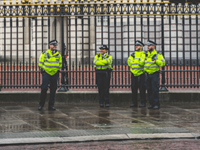The UK body charged with police oversight, has uncovered significant deficiencies in vetting standards. These failures have resulted in individuals with criminal records or ties to organised crime obtaining positions in the police force. The review conducted by His Majesty’s Inspectorate of Constabulary and Fire & Rescue Services (HMICFRS) looked closely at police vetting files and uncovered numerous examples of individuals who should not have passed the checking required to join law enforcement agencies. Some more serious cases highlighted potential risks posed by officers to the public. The government initiated the review following the 2021 murder of Sarah Everard by serving Metropolitan Police officer Wayne Couzens.
Police Vetting Generally Good
While inspectors generally agreed with the vetting and recruitment decisions made by police forces, they found 68 instances where they believed the applicants should not have been employed at all by the police force. Vetting to join the police force is more detailed than a standard disclosure check for other occupations, and might also look at the backgrounds and records of family members or close friends of the person applying to work as a police officer. Police officers also undergo regular credit checking to minimise the risks of them being open to bribery or blackmail, and social media screening to ensure there is nothing online which might call their characters into question. Having a criminal record will not automatically block you from joining, but it will depend on the nature of the offence and the time elapsed.
In several cases, the Police Standards review team discovered insufficient evidence that forces had adequately assessed risks or taken measures to mitigate them, such as closer supervision of a new officer. They also found that some forces had experienced staff shortages within their vetting units which had led to bad decisions being made. The review also identified instances of officers transferring without any issues between different police forces, despite having a history of worrying intelligence, complaints, or misconduct allegations made against them.
Need for Stricter Vetting for Police Officers
Matt Parr, His Majesty’s Inspector of Constabulary, emphasised the necessity for stricter vetting and more serious handling of sexual misconduct allegations. He concluded that weak decision-making, inconsistent misconduct case management, and inadequate monitoring of officers’ IT use were prevalent and could have severe consequences for the police force and members of the general public. Despite prior warnings to police Chief Constables, efforts to improve standards and address misogynistic and predatory conduct within policing have been insufficient, according to the Inspectors.
The Inspectorate of Constabulary called on police forces to do better in preventing unsuitable candidates from joining the service in the first place, and to promptly remove officers and staff if shown they are unfit for public service. The report from the Inspectorate included 43 different recommendations to be implemented by the police service, not just in the ways police services are recruited, but also in the processes around dealing with complaints made about serving officers, and dealing with allegations of corruption and misconduct in a more consistent manner.





